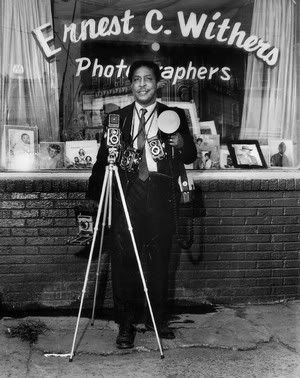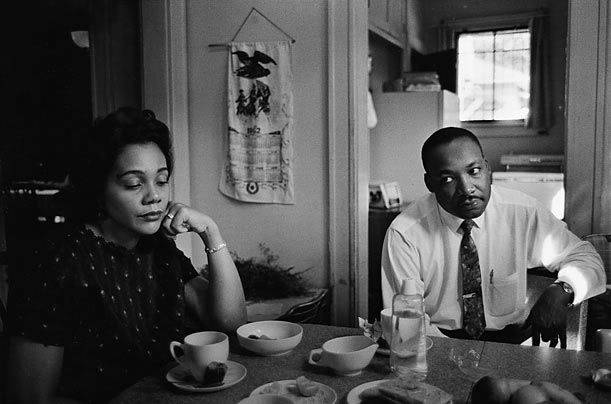
Photo by � Ernest C. Withers Trust, courtesy Decaneas Archive, Boston, Mass.
Chronicler and informant: Ernest C. Withers is shown in 1968 in front of his Beale Street studio. That same year, the respected chronicler of the civil rights era passed photographs and information to a now-defunct wing of the FBI that was spying on Americans. (� Ernest C. Withers Trust, courtesy Decaneas Archive, Boston, Mass.)
As despicable as Mr Withers apparently was, he was much less of a threat to MLK than Merrell McCullough. By the way, not all of the corporate media ignored the story. As indicated in the final excerpt (below)
Sam Donaldson actually uncovered some of the details about Merrell McCullough by tracking him down at the CIA. Unfortunately his fine reporting never made it to air :tv: ...
Eyewitness to Murder: The King AssassinationMarrell McCollough was the undercover cop who had infiltrated the radical black youth group the Invaders, prior to King's arrival in Memphis. And it was the Invaders who had provoked a show of violence during King's first visit to Memphis in March. They did this by disrupting a demonstration by the Sanitation Workers, who were on strike at the time. This incident actually resulted in the shooting death of a young man named Larry Payne. In turn, this caused King to make his return visit in April.
McCollough's assignment was the result of a secret program inside the Memphis Police Department. But it had been ordered by Hoover, and assisted by the CIA. (Probe Vol. 7 No. 6 p. 4) Before joining the Memphis Police Department, McCullough had been in the army as an MP. His first assignment with the police was this one. As an agent provocateur with the Invaders, his reports were forwarded to the FBI. Besides helping provoke the King riot, he also helped set up a drug bust in which many of the Invaders top leadership were entrapped.
A local reporter in Memphis once wrote that McCullough was working for the FBI before the Memphis police recruited him. (Ibid. p. 5)
This strongly indicates that he was part of the COINTELPRO operation against both Black Nationalist groups, and perhaps, King. He stayed within the police department until he later joined the CIA in 1974. Three years later, he testified before the
House Select Committee on Assassinations. When asked his occupation, he said he was a Memphis policeman. Which, at the time, he was not. Further, he denied any connection to any intelligence agencies in 1968. In other words, he lied. As Doug Valentine notes, he appears to have done this because the
HSCA had evidence that it was McCullough who provoked the riot that caused the death of Larry Payne. And made necessary King's return, which resulted in his assassination. (Ibid.) All O'Brien has to say about the compelling and perhaps crucial figure of
McCullough is this: he was a policeman who worked undercover against a Black Nationalist group. He ended up on the balcony of the Lorraine Motel after King was shot. Six years later he joined the CIA. That's about it. I'm not kidding...  CTKA Review: 13th Juror
CTKA Review: 13th JurorWhich now brings us to
Merrell McCullough. McCullough was one of the informants masquerading as an Invader. Secretly, he was a police informant who was also connected to the FBI. It turns out that, before the murder, Merrell was introduced to Jowers as a policeman. (p. 184) Right before the assassination, McCullough had been in Jim's Grill meeting with four other men. (p. 188) One of whom was another member of the police force named Lt. Zachery. (p. 204) One of the extraordinary disclosures made at the trial concerned
Sam Donaldson, the reporter who originally broadcast Jowers revelations in 1993. As we will see later, there was a backup hit team in town from military intelligence. We also know from a famous photograph that McCullough immediately ran up to the balcony after King was hit.  In that picture, while others are pointing to where they think the shot came from, McCullough appears to be calmly checking King for vital signs while looking across the way. According to what Donaldson told Young, McCullough was on the balcony to check King's pulse and make sure he was dead and signal the military sniper team that no second shot was needed...http://www.blackopradio.com/pod/black488b.mp3
In that picture, while others are pointing to where they think the shot came from, McCullough appears to be calmly checking King for vital signs while looking across the way. According to what Donaldson told Young, McCullough was on the balcony to check King's pulse and make sure he was dead and signal the military sniper team that no second shot was needed...http://www.blackopradio.com/pod/black488b.mp3
By Jim Douglass
Coretta Scott King testified that her husband had to return to Memphis in early April 1968 because of a violent demonstration there for which he had been blamed. Moments after
King upon arriving in Memphis joined the sanitation workers� march there on March 28, 1968, the scene turned violent � subverted by government provocateurs, Lawson said. Thus King had to return to Memphis on April 3 and prepare for a truly nonviolent march, Mrs. King said, to prove SCLC could still carry out a nonviolent campaign in Washington...
http://www.ctka.net/pr500-king.html